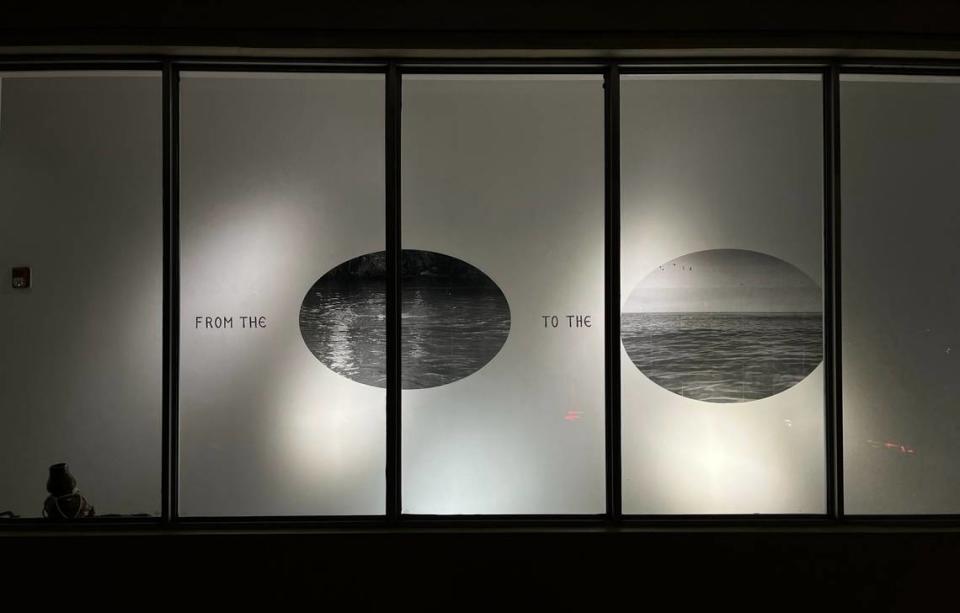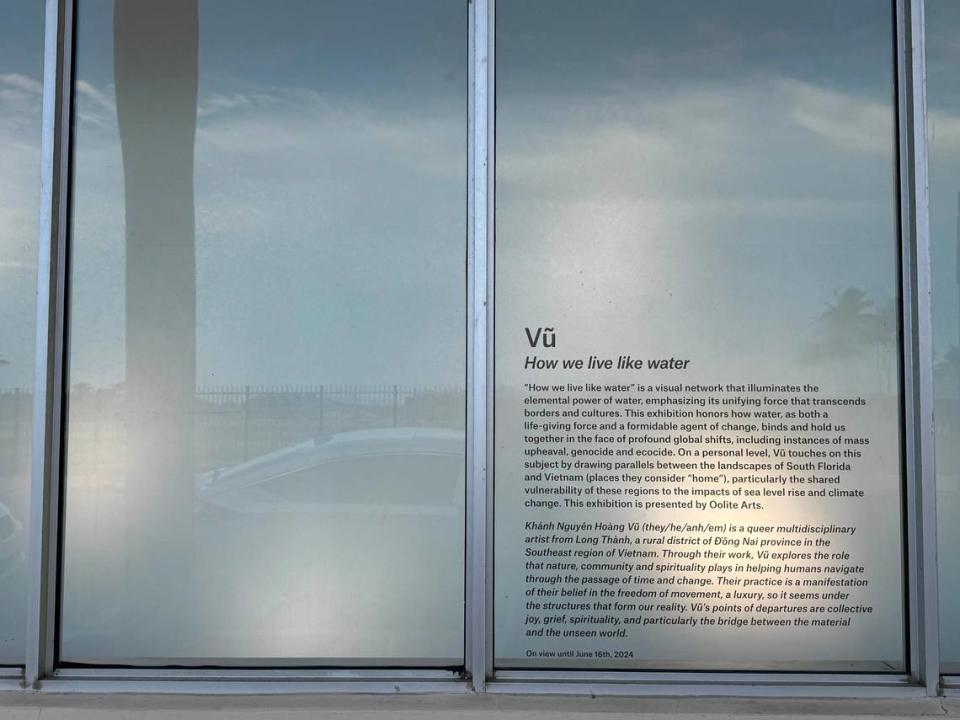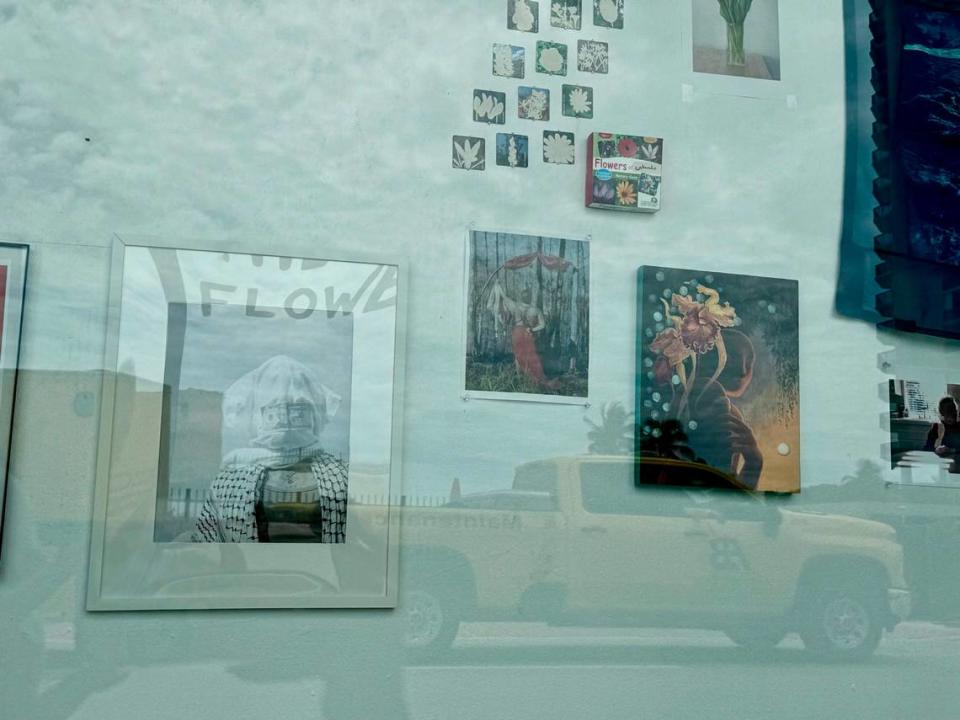Artists add pro-Palestinian art to Walgreens installation to protest a Miami nonprofit
A Miami arts nonprofit set off a controversy last month when it removed pro-Palestinian artwork from a Walgreens window display in Miami Beach. The decision came after a complaint alleged that it was hate speech, and the removal left a blank space on the wall.
Weeks later, several South Florida artists have filled the space in protest with more pro-Palestinian artwork.
In one painting, the phrase “Liberation then! Liberation now!” wraps around a watermelon, a symbol of Palestinian solidarity. There are photographed portraits of people wearing wearing keffiyehs. A framed red poster reads “divest from death.” White letters written across the window glass read, “Killing the flowers will not delay spring.”

It’s is the latest in an ongoing saga that has embroiled Miami’s tight-knit arts community since May 3 when nonprofit Oolite Arts removed a piece of art that referenced the controversial pro-Palestinian phrase “from the river to the sea,” which is often criticized as anti-Semitic hate speech that calls for violence against Jews.
The art was in a Walgreens window display at 67th Street and Collins Avenue. Oolite and Walgreens have had a partnership to display artwork at two Miami Beach locations since 1999.
The removed artwork was part of an art installation called “How we live like water,” by South Florida artist Vũ Hoàng Khánh Nguyên, who goes by Vũ and uses they/them pronouns.
Vũ shared the protest art on Instagram Friday morning, referring to it as a “week-long pop-up group exhibition featuring works that reflect themes of grief, resilience, and solidarity.”
“It’s just to keep the conversation going, keeping eyes on Palestine and the other ongoing genocides in the world,” Vũ told the Miami Herald. “It’s kind of a time stamp and an act of defiance at the same time.”

In a statement through a spokesman, Oolite said: “We were just made aware that something had been placed in the window and we are reviewing.”
The controversy surrounding Oolite and Vũ’s work reflects a larger global conversation surrounding the Israel-Hamas war. Hamas attacked Israel on Oct. 7, killing about 1,200 people and taking about 240 hostages. Israel responded by attacking Gaza with a stated goal of eliminating Hamas, killing about 37,000 Palestinians. Israel has been heavily scrutinized internationally for its military offensive in Gaza.
The backstory

Founded in 1984 as ArtCenter/South Florida, Oolite Arts is well known in Miami’s arts community. The organization, which has a location on Lincoln Road in South Beach, provides free studio spaces, grants and exhibition opportunities. Many of the artists critical of Oolite’s recent decision have received grant funding, studio spaces and housing stipends from the organization before.
Vũ, who participated in an Oolite residency program in the past, said a curator from Oolite reached out to them last August about creating a Walgreens installation. Vũ said Oolite approved a proposal for the exhibition, which largely focuses on themes of water and migration.
Vũ and some friends installed the exhibition, including pottery, fishing nets and paintings, the week of March 20. That’s when Vũ came up with the idea to include the artwork referencing “from the river to the sea,” the artist said.

Born in Vietnam, Vũ said they sympathize heavily with the plight of the Palestinian people, in part because their parents were refugees of the Vietnam War. Vũ said their artwork was a call for peace, not violence.
“It’s this transgenerational passage of trauma that is a repercussion of war, and then I’m witnessing it happen to people presently,” Vũ said. “I just decided it was the least I could do to use my voice with whatever platform I had.”
About four weeks went by before Oolite received a complaint about the artwork.
In an interview with the Herald earlier this week, Oolite board chair Marie Elena Angulo said she received a call from a man on May 3 who said he was asked by some Jewish community members to reach out to her to question “why that piece was on the Walgreens window in the middle of a Jewish community.” She told him she was not aware of the piece and would look into it.
Angulo said she then contacted the Oolite co-interim directors and the executive committee, a subset of the board of directors, about the artwork. Angulo and the executive committee decided to remove the artwork, she said. A co-interim director called Vũ that afternoon to let them know that the artwork would be taken down. By 4 p.m., Angulo said, the artwork was gone.

Days after the work was removed in early May, Vũ posted a public statement online about the incident and said that Oolite did not consult with them before it decided to remove the work. An open letter written by fellow artists in support of Vũ accused Oolite of censorship. The open letter called for a public town hall to discuss the matter and Angulo’s resignation, who artists suspected of deciding to remove the artwork unilaterally. The open letter received over 700 signatures.
After Oolite resident artists met with interim director Maggy Cuesta in mid-May over Zoom, an in-person meeting between Vũ and Angulo was scheduled for June 20.
The protest

Tensions remained high in Miami’s arts community for the next month, with some strongly condemning Oolite’s decision on social media, and others, including some Jewish artists, supporting its decision. The conversation was ignited again on June 4 when Oolite posted a statement from its board of directors, effectively standing by its decision to remove the work and apologizing to those offended by the artwork and the artwork’s removal. Oolite said its contract with Walgreens prohibits controversial works.
“We believe strongly in the right to artistic expression, but the particular phrase highlighted in this piece is perceived by many as a literal call for violence against them,” the statement said. The organization also said it is conducting a policy review.
Many artists were unimpressed with the statement and took to the comment section to air their grievances. Just two days later, some called for a boycott, asking for artists to not participate in Oolite exhibitions, film screenings, lectures and open studios events until the organization agrees to a town hall with the greater artistic community. The boycott does not ask artists to leave Oolite studios or refuse grant money.
Angulo said she has received supportive messages from arts community members and added, “no one is willing to speak up because everyone is terrified of saying anything in support of Oolite because the few people who have had been obliterated on social media.”
Angulo told the Herald she stands by her and the executive committee’s decision to remove the artwork. She said she would have made the same decision if she had gotten a call from a Black resident about racist imagery in a Walgreens window.
“There’s an appropriate place for that artwork, which is not the private window of a drugstore in the middle of a Jewish community,” Angulo said. “No matter who you ask, that phrase is controversial. It doesn’t matter who uses it. If it’s used by Israel, it’s controversial. If it’s used by the Palestinians, it’s controversial.”

The day the artwork was removed, Vũ said, the board told the curator to arrange with Vũ to replace the work. “They said that I can’t leave the wall empty because that would be a political message,” Vũ said. But, Vũ said they were never given specific instructions or a deadline to replace the art.
“It’s silly that they made me address the political statement of the blank wall because I was like, ‘OK, I’ll address it,” the artist said.
Vũ and some friends quietly arranged to fill the blank space with artworks that were installed over the last couple of days, Vũ said. Vũ was out of town and did not participate in installing the artworks. They declined to comment on how the artists got into the Walgreens window space.
“I didn’t want it to be just me saying something,” Vũ said. “I wanted it to be a collective statement.”
Among the artists with work in the window is Elias Rischmawi, a Miami-based Palestinian artist who uses they/them pronouns. Rischmawi’s work is a photograph of a person whose shoulders are draped in a keffiyeh and whose face is covered by a cloth. A $20 bill covers the mouth.
Rischmawi said the photograph was inspired by instances of censorship they have experienced as a Palestinian artist in Miami. It’s a critique of “art institutions portraying themselves as leftist and for the community, but they’re not progressive for Palestine,” Rischmawi said.
Though Rischmawi isn’t sure if Oolite will take the works down, the artist said it was important to participate.
“People are going to be mad, but I think people will question, too, and be curious. I hope it opens more dialogue and conversation,” Rischmawi said. “That’s also the point of this protest, if you want to call it that. It’s to create dialogue.”
This story was produced with financial support from individuals and Berkowitz Contemporary Foundation in partnership with Journalism Funding Partners, as part of an independent journalism fellowship program. The Miami Herald maintains full editorial control of this work.


